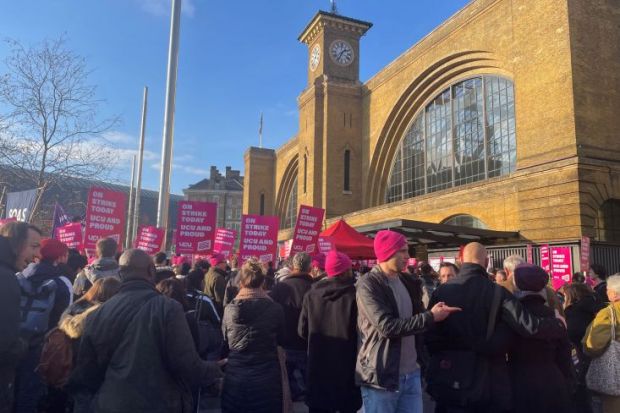Public disagreements over tactics may derail the University and College Union’s push for a better pay deal for UK higher education staff, but members are still confident of finding a way forward that keeps the pressure on employers.
The union’s general secretary, Jo Grady, was accused of undermining union democracy after she posted on Twitter a video pushing back on calls for an indefinite strike in the new year, even though the action had already been backed by the higher education committee.
The intervention, made just as the latest round of talks on a new pay deal began, prompted her opposite number at the negotiating table, Raj Jethwa, the chief executive of the Universities and Colleges Employers Association, to call for an end to “infighting” for the good of the pay talks and the sector.
Dr Grady – who has backed taking escalating, targeted strike action – has called for members to get involved in shaping the strategy ahead of what will likely be heated meetings aimed at resolving the divisions in the new year.
Debates between those who have an “innate belief” in the power of strikes and those who think a more “mix and match” approach involving other tactics such as assessment boycotts date back to the 1980s, resulting in “a lot of bad blood” between the two sides, according to Gregor Gall, a research associate at the University of Glasgow and an expert in industrial relations.
“Though there could be a middle ground – using both strikes and boycotts – the divisions are now so deep-seated…that it is unlikely any compromise or consensus can be reached,” he added.
One of those who favoured the all-out strike, Jamie Woodcock, a senior lecturer in management and marketing at the University of Essex, said “rapid escalation” was needed to get employers to “seriously negotiate”.
“The UCU leadership has let members down many times, but an indefinite strike puts the power back in the hands of academic workers to resolve this dispute,” he said.
Sam Marsh, senior vice-president for the University of Sheffield’s UCU branch, said there was a “fair chance” that members would back an indefinite strike, given the “hard-line approach” taken by the sector’s management in response to demands for more pay and better working conditions in recent years.
But Sylvia de Mars, a senior lecturer in law at Newcastle University, has drafted a motion to the higher education committee raising concerns about an indefinite strike, highlighting the union’s depleted “fighting fund” and pointing out that other unions have had more success with a limited action approach.
She called for an indefinite strike to be reserved for the summer assessment period, if “discontinuous escalating action over 2023” does not work.
Overall, she told Times Higher Education, it was still possible for the union to “have a discussion about the best way forward, then unite behind an action plan in order to win our demands”.
Emma Battel Lowman, a research associate at the University of Leicester who sits on the higher education committee, agreed that compromise was possible because members shared the same view of the aims of the dispute, if not the tactics.
Dr Gall said that if members were to make the final decision, the majority would likely favour a less aggressive approach, given the demands of an indefinite strike in terms of lost pay.
Such a “fractious process” would not weaken that UCU’s position in negotiations if the strategy targets “key points in the academic calendar”, he predicted.
后记
Print headline: The choice facing the UCU – indefinite strike or ‘escalating’ action?




